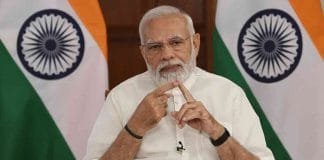INVC,,
New Delhi,,
There is no dilution in the Government’s two-pronged policy to deal with the Naxal menace. Addressing a meting of the Consultative Committee of the Ministry of Home Affairs here today, the Union Home Minister, Shri P. Chidambaram asserted that accelerated development and calibrated police action continued to be the two pillars of the Government’s anti-Naxal policy. He pointed out that on both the fronts, primary responsibility rests with the State Government, although the Centre has an important role to play. On the front of police action, the Centre has to provide paramilitary forces to the State Government, but it is the officers of the State police who have to lead the operations. Success of the operations largely depends on the soundness of the plans, prepared by the State Government and its efficient implementation. On the developmental front, while the Centre provides substantial funds to the State Government under various schemes, the machinery to implement the schemes and utilize the funds rests under the control of the State Governments. In this connection, he pointed out that nearly one-third of the funds provided to the 35 worst affected Naxal districts under developmental schemes like Pradhan Mantri Gram Sadak Yojana, National Rural Employment Guarantee Scheme , Rajiv Gandhi Grameen Vidyutikaran Yojana, National Rural Drinking Water Supply Programme, Sarva Shiksha Abhiyan and Indira Awas Yojana, etc., remained unutilized. There are also questions about whether the money spent actually reached the intended beneficiaries. The Home Minister said that it is important to secure the Naxal-affected areas for apprehending Naxal leaders, restoring civil administration and bringing about development there. The Home Minister asserted that Naxals do not want development of the tribal-dominated areas. This is clear from the wantonness with which they have been destroying the developmental infrastructure. In 2009 alone, Naxals targeted 362 telephone towers, school buildings, roads, culverts, etc.
Refuting the allegation that security forces are working with obsolete weapons, the Home Minister said that the Centre has equipped its paramilitary forces deployed in Naxal-affected areas with latest weapons. State Governments have also started acquiring modern weapons, but they have some distance to go. Shri Chidambaram said that the main area of concern is the lack of required manpower, as the vacancy level in State police forces is very high. These vacancies need to be filled up quickly and the recruited personnel need to be imparted necessary training before they can be deployed for anti-Naxal operations.
Suggestions made by the members at today’s meeting included greater involvement of Panchayati Raj Institutions in developmental activities, improving the service conditions of para-military force personnel and promoting cordial relations between local people and security forces.
Today’s meeting was held in continuation with the meeting of the Consultative Committee held on 23rd April, 2010 on the subject of “Left Wing Extremism”.
Those who attended the meeting included Dr. K. Keshava Rao, S/Shri Rishang Keishing, H.K. Dua, and Mohd. Ali Khan from the Rajya Sabha and Dr. Thokchom Meinya, S/Shri Kalyan Banerjee, N. Dharam Singh, and Mahabal Mishra from the Lok Sabha
The Ministers of State for Home, Shri Mullappally Ramachandran and Shri Ajay Maken were among those present at the meeting.
















